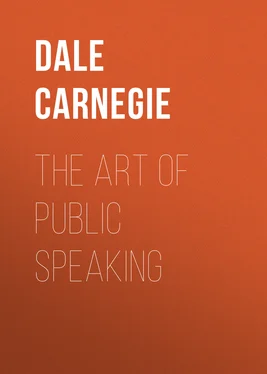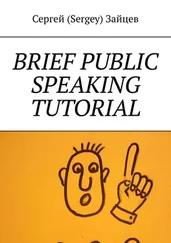Note how light and short the inflections are in the following brief quotation from "Anthony the Absolute," by Samuel Mervin.
At Sea—March 28th .
This evening I told Sir Robert What's His Name he was a fool.
I was quite right in this. He is.
Every evening since the ship left Vancouver he has presided over the round table in the middle of the smoking-room. There he sips his coffee and liqueur, and holds forth on every subject known to the mind of man. Each subject is his subject. He is an elderly person, with a bad face and a drooping left eyelid.
They tell me that he is in the British Service—a judge somewhere down in Malaysia, where they drink more than is good for them.
Deliver the two following selections with great earnestness, and note how the inflections differ from the foregoing. Then reread these selections in a light, superficial manner, noting that the change of attitude is expressed through a change of inflection.
When I read a sublime fact in Plutarch, or an unselfish deed in a line of poetry, or thrill beneath some heroic legend, it is no longer fairyland—I have seen it matched.—Wendell Phillips.
Thought is deeper than all speech,
Feeling deeper than all thought;
Souls to souls can never teach
What unto themselves was taught.
—Cranch
It must be made perfectly clear that inflection deals mostly in subtle, delicate shading within single words , and is not by any means accomplished by a general rise or fall in the voice in speaking a sentence. Yet certain sentences may be effectively delivered with just such inflection. Try this sentence in several ways, making no modulation until you come to the last two syllables, as indicated,
| And yet I told him dis- |
|
|
| -------------------------- |
|
|
| (high) |
| |
|
|
| |
tinctly. |
|
|
------------------------- |
|
|
(low) |
|
|
tinctly. |
|
|
------------------------- |
|
| |
(high) |
|
| And yet I told him dis- |
| |
|
| ------------------------- |
|
| (low) |
|
|
Now try this sentence by inflecting the important words so as to bring out various shades of meaning. The first forms, illustrated above, show change of pitch within a single word ; the forms you will work out for yourself should show a number of such inflections throughout the sentence.
One of the chief means of securing emphasis is to employ a long falling inflection on the emphatic words—that is, to let the voice fall to a lower pitch on an interior vowel sound in a word. Try it on the words "every," "eleemosynary," and "destroy."
Use long falling inflections on the italicized words in the following selection, noting their emphatic power. Are there any other words here that long falling inflections would help to make expressive?
ADDRESS IN THE DARTMOUTH COLLEGE CASE
This, sir, is my case. It is the case not merely of that humble institution; it is the case of every college in our land. It is more ; it is the case of every eleemosynary institution throughout our country—of all those great charities founded by the piety of our ancestors to alleviate human misery and scatter blessings along the pathway of life. Sir, you may destroy this little institution—it is weak , it is in your hands. I know it is one of the lesser lights in the literary horizon of our country. You may put it out. But if you do you must carry through your work; you must extinguish, one after another, all those great lights of science which, for more than a century, have thrown their radiance over our land!
It is, sir, as I have said, a small college, and yet—there are those who love it!
Sir, I know not how others may feel, but as for myself when I see my alma mater surrounded, like Cæsar in the senate house, by those who are reiterating stab after stab , I would not for this right hand have her turn to me and say, And thou, too , my son!
—Daniel Webster.
Be careful not to over-inflect. Too much modulation produces an unpleasant effect of artificiality, like a mature matron trying to be kittenish. It is a short step between true expression and unintentional burlesque. Scrutinize your own tones. Take a single expression like "Oh, no!" or "Oh, I see," or "Indeed," and by patient self-examination see how many shades of meaning may be expressed by inflection. This sort of common-sense practise will do you more good than a book of rules. But don't forget to listen to your own voice.
1. In your own words define (a) cadence, (b) modulation, (c) inflection, (d) emphasis.
2. Name five ways of destroying monotony and gaining effectiveness in speech.
3. What states of mind does falling inflection signify? Make as full a list as you can.
4. Do the same for the rising inflection.
5. How does the voice bend in expressing ( a ) surprise? ( b ) shame? ( c ) hate? ( d ) formality? ( e ) excitement?
6. Reread some sentence several times and by using different inflections change the meaning with each reading.
7. Note the inflections employed in some speech or conversation. Were they the best that could be used to bring out the meaning? Criticise and illustrate.
8. Render the following passages:
Has the gentleman done? Has he completely done?
And God said, Let there be light: and there was light.
9. Invent an indirect question and show how it would naturally be inflected.
10. Does a direct question always require a rising inflection? Illustrate.
11. Illustrate how the complete ending of an expression or of a speech is indicated by inflection.
12. Do the same for incompleteness of idea.
13. Illustrate ( a ) trembling, ( b ) hesitation, and ( c ) doubt by means of inflection.
14. Show how contrast may be expressed.
15. Try the effects of both rising and falling inflections on the italicized words in the following sentences. State your preference.
Gentlemen, I am persuaded , nay, I am resolved to speak.
It is sown a natural body; it is raised a spiritual body.
In the following selections secure emphasis by means of long falling inflections rather than loudness.
Repeat these selections, attempting to put into practise all the technical principles that we have thus far had; emphasizing important words, subordinating unimportant words, variety of pitch, changing tempo, pause, and inflection. If these principles are applied you will have no trouble with monotony.
Constant practise will give great facility in the use of inflection and will render the voice itself flexible.
CHARLES I
We charge him with having broken his coronation oath; and we are told that he kept his marriage vow! We accuse him of having given up his people to the merciless inflictions of the most hot-headed and hard-hearted of prelates; and the defence is, that he took his little son on his knee and kissed him! We censure him for having violated the articles of the Petition of Right, after having, for good and valuable consideration, promised to observe them; and we are informed that he was accustomed to hear prayers at six o'clock in the morning! It is to such considerations as these, together with his Vandyke dress, his handsome face, and his peaked beard, that he owes, we verily believe, most of his popularity with the present generation.
Читать дальше












